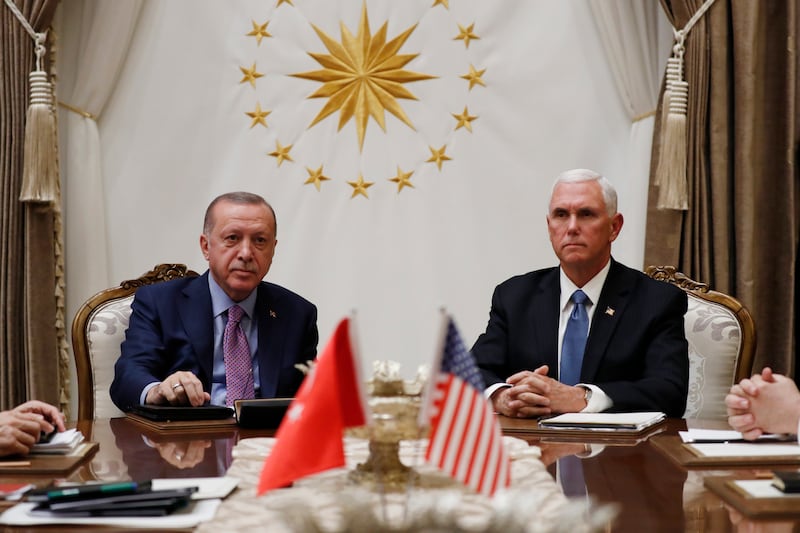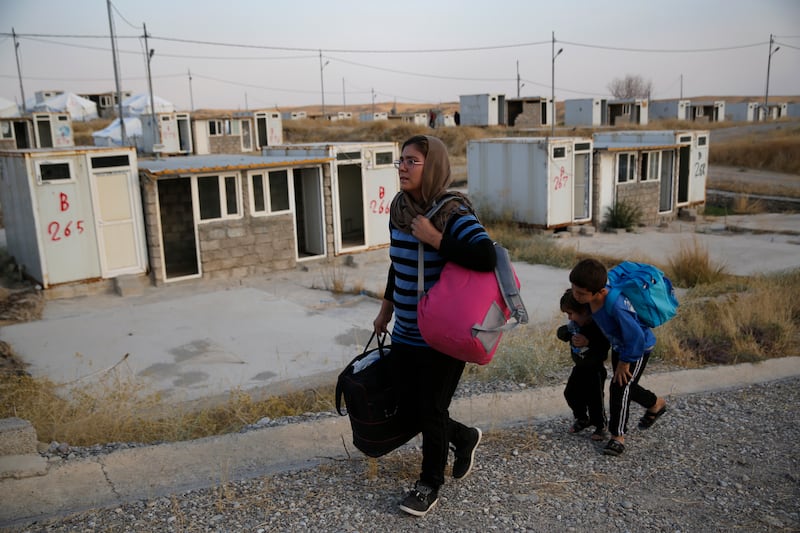SALT LAKE CITY — President Donald Trump wants to exit endless wars in the Middle East and champion religious freedom. In Syria, he may not be able to do both, according to experts on religious persecution.
Trump’s decision earlier this month to withdraw troops from northeast Syria satisfied the first objective, but it allowed Turkish fighters to advance on the region. Within a matter of days, Syrian Christians and members of other minority faith groups were fleeing for their lives.
“I think, in the big picture, the Trump administration has been exceptional on religious liberty, but this is a major misstep which sent mixed signals to Christians in the Middle East,” said David Curry, the CEO of Open Doors, a Christian humanitarian organization based in California that’s been providing food, water and medical care to affected communities.
The ceasefire agreement, which was announced Thursday, may reduce physical violence in the short-term, but it leaves the future of religious freedom in the region in flux, said Tony Perkins, chairman of the U.S. Commission on International Religious Freedom.
The Kurds, who previously controlled the region, support religious pluralism. It’s unlikely that Turkey, the Syrian president, Russia and the Islamic State — who all benefit from the withdrawal of U.S. troops — will do the same.
“This is a much more complicated situation now,” Perkins said.
Or, as Curry put it, “Turkey will not protect (religious minorities.) It will kill them or allow them to be killed.”
New instability
Christians in northeast Syria today are no strangers to violence. Many of their ancestors arrived in the area after fleeing nearby wars, said Jeremy Barker, director of the Religious Freedom Institute’s Middle East action team.
“There is a legacy of persecution in many of these towns,” he said.
In recent years, these Christians experienced violence firsthand during the rise of the Islamic State and the Syrian civil war. There were about 130,000 Christians in northeast Syria before these conflicts, but over the past few years, that figure has fallen to around 40,000, said Peter Burns, the director of government relations for In Defense of Christians, an organization that advocates on behalf of persecuted Christians.
Trump’s troop withdrawal decision dealt the Christian population in the region an additional blow. Overall, more than 160,000 residents have been internally displaced over the last two weeks, according to the United Nations, including many Christians, Burns said.
“There were thriving villages that are now basically ghost towns,” he said. “New instability creates another challenge for this community that has already suffered so much.”
It also creates an image problem for the Trump administration, which is regularly praised for its commitment to international religious freedom. Officials ignored repeated warnings about how a sudden troop withdrawal would affect religious minority groups.
“About six months ago, when the announcement was first made that we planned to pull U.S. troops out, we expressed our concern,” Perkins said.
The backlash to Trump’s decision was swift. Republican leaders, religious freedom advocates and prominent evangelical Christians all questioned what he was thinking.
“This administration has an established track record of putting a priority on religious freedom, but I do think it was eclipsed by other priorities in this particular case,” Perkins said.
Conflicting foreign policy concerns often outweigh America’s commitment to religious freedom, so, in that sense, the recent drama isn’t surprising. But it’s still problematic and can’t happen again if the Trump administration truly wants to bring an end to religious persecution around the world, Barker said.
“To promote religious freedom effectively, it must be recognized as more than just a boutique human rights issue, but rather should be viewed as a central foreign policy priority,” he said.
Repairing the damage
Burns and others who have raised the alarm about religious freedom in Syria said they’re confident the Trump administration will work to improve the situation on the ground. Within a few days of the Turkish invasion, U.S. officials had earmarked $50 million in stabilization assistance funds and threatened Turkish leaders with economic sanctions.
“I think there’s been a serious response to this and serious concern and attention paid to it,” Burns said, noting that the debacle likely won’t tarnish Trump’s religious freedom reputation.

However, Thursday’s ceasefire deal, which was brokered by Vice President Mike Pence and Secretary of State Mike Pompeo, does leave some important questions unanswered, Barker said. It’s a good first step toward restoring peace, but it won’t protect religious minorities in the region long-term.
Although the ceasefire agreement does highlight the need to protect “religious and ethnic minorities,” it also requires Kurdish fighters to retreat from northeast Syria. It’s possible that some Christians will be lumped in with that group, Burns said.
“We want to be sure that, in the creation of the safe zone, these (Christians) are able to return to their homes,” he said.
Members of the Trump administration likely share this goal, since they’ve championed efforts to rebuild Christian homelands in the Middle East and rejected calls to resettle more refugees in the U.S.
“Our approach for Christians in the Middle East and for other people who are being religiously persecuted around the world … is to try and create the conditions inside their own countries so that they can have that religious freedom,” Pompeo told the Christian Broadcasting Network in July.
Last month, officials announced that the U.S. will only accept up to 18,000 refugees in the year ahead, an 84% drop from the last cap proposed by the Obama administration, according to the Associated Press. Five thousand of those refugee slots will be reserved for victims of religious persecution.
Many American religious leaders argue the Trump administration’s viewpoint on refugees is cruel and naive, especially when foreign policy decisions like the troop withdrawal in Syria exacerbate the refugee crisis.
However, Curry and Burns generally support the administration’s approach and said most Christians in the Middle East would prefer not to have to start a new life somewhere else. Burns recalled meeting recently with a 70-year-old man in northern Iraq who felt privileged to live near a church that had been served by his family for seven generations even though ongoing violence in the area meant he heard airstrikes nearly every day.
“The vast majority of these people don’t want to be resettled. They’re not looking to leave or trying to leave,” Burns said.
The Middle East will be more stable if they’re able to stay, Curry said.
“A pluralistic Middle East that has Christians and Muslims living peacefully side by side ... is good for everybody,” he said.


